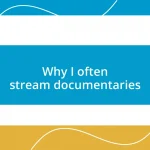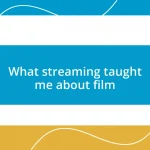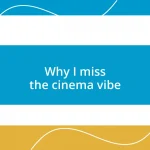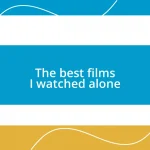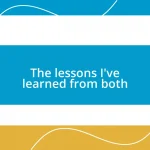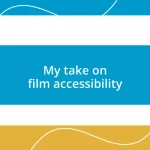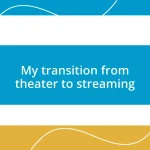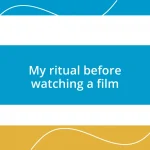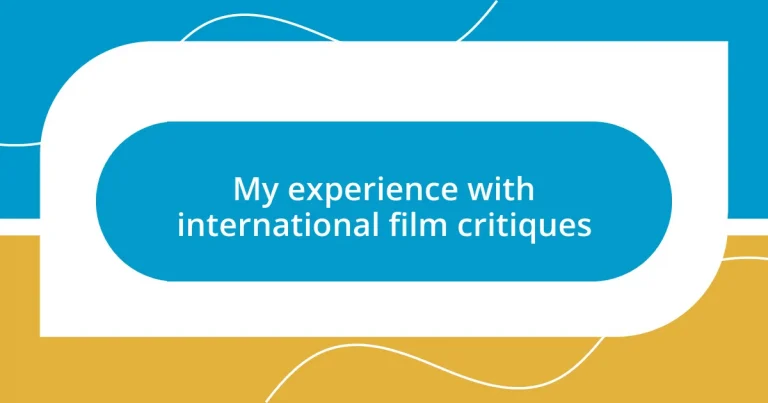Key takeaways:
- Film critique transcends summary, encouraging a deeper exploration of themes, personal experiences, and cultural contexts that shape interpretations.
- Diverse international perspectives enrich film critiques, revealing how cultural backgrounds influence emotional responses and narrative understandings.
- Embracing feedback is crucial for growth in film critiques, fostering deeper insights and connections with audiences through vulnerability and openness to diverse opinions.
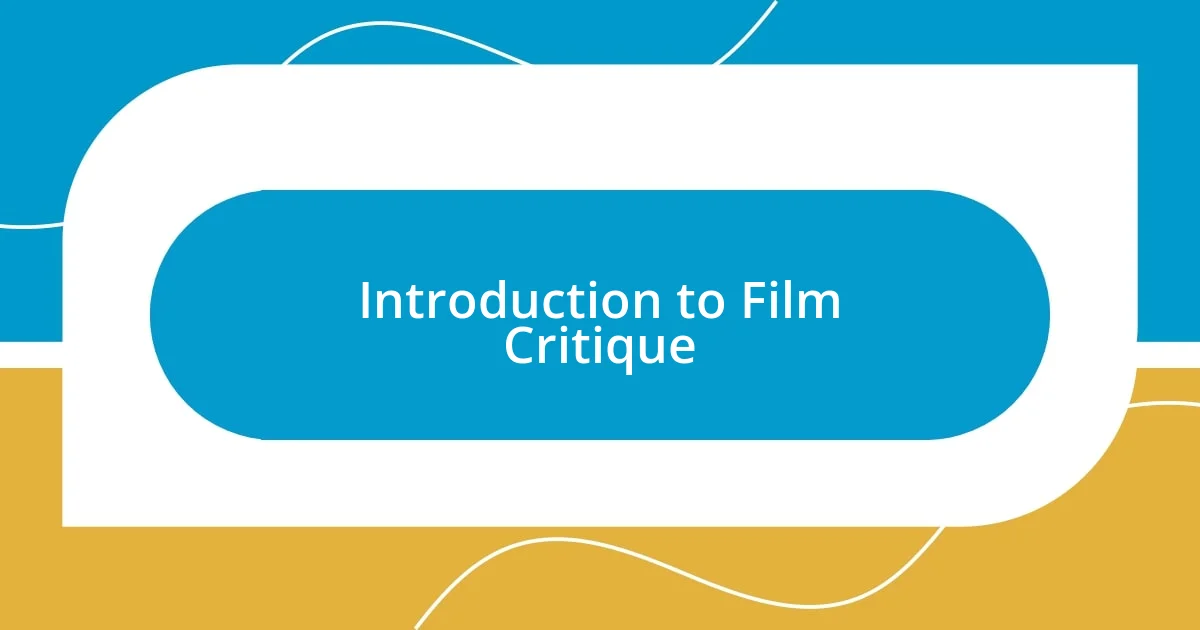
Introduction to Film Critique
Film critique is more than just summarizing a movie; it’s an in-depth exploration of its themes, direction, and cultural impact. I remember watching a film that struck a chord with me, sparking my desire to delve deeper into its layers. What makes a film resonate with audiences or fall flat? This question fueled my journey into understanding the intricate art of film critique.
As I began to engage with different international films, I realized that critique often reflects the critic’s personal experiences and cultural background. For instance, I once wrote about a foreign film that mirrored my own struggles with identity, making my analysis deeply personal. Isn’t it fascinating how a film can connect us across borders through shared emotions and experiences?
Moreover, film critique serves as a dialogue between the viewer and the film itself. When I critique a movie, I often ask myself, how does it challenge societal norms or provoke thought? This back-and-forth exchange not only enhances my appreciation for cinema but also fosters a greater understanding of the world around me. Through critique, we celebrate cinema’s power to spark conversations and inspire change.
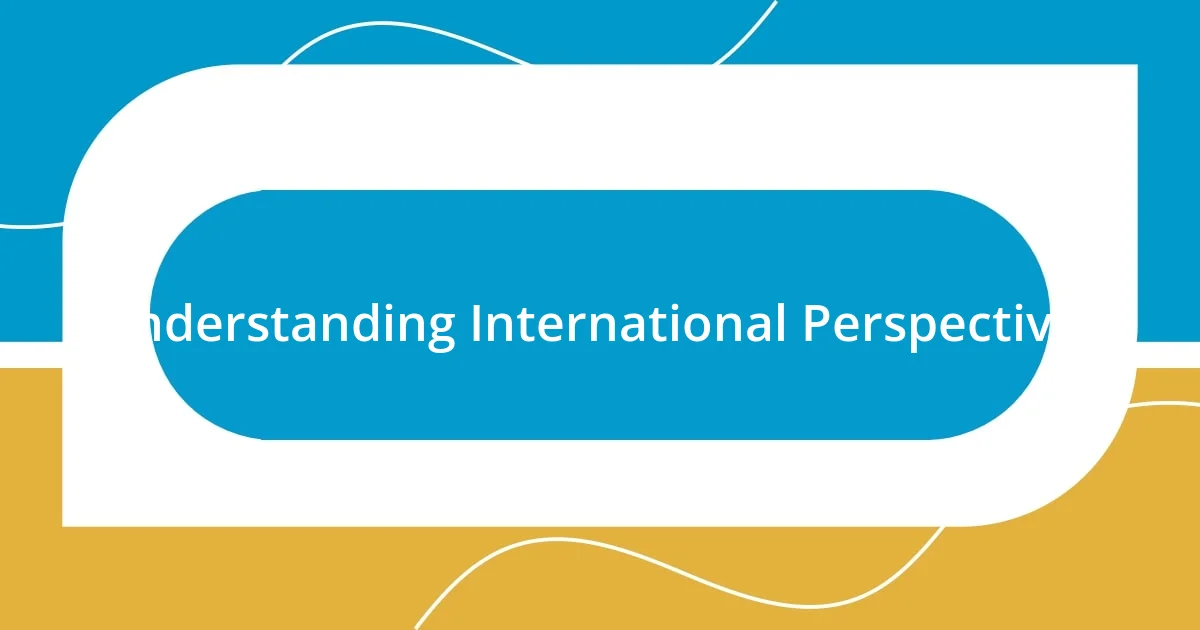
Understanding International Perspectives
Understanding different international perspectives is crucial when engaging with film critique. I vividly remember my first experience watching an Indian film. The vibrant storytelling and emotional depth were particularly striking to me. These elements stemmed from cultural nuances that I had never encountered before. It made me realize how our backgrounds shape our interpretation of film. Have you ever seen a movie that left you puzzled at first, only to discover its beauty after understanding its cultural context? That’s the power of diverse perspectives.
As I explored cinema from various countries, I found that each film told not just a story but also conveyed the values and struggles of its culture. For instance, watching a Japanese film about grief helped me appreciate subtle emotional expressions. The film’s quiet moments of reflection resonated deeply with me. It’s as if the director was inviting me into a conversation about loss, something universally felt yet uniquely portrayed. How can a single film evoke such varied emotions across different viewers? The answer lies in our individual histories and cultural frameworks.
The differences in international perspectives encourage a richer dialogue in film critique. While some films leave audiences feeling uplifted, others may provoke uncomfortable reflections. I recall critiquing a European film that tackled societal issues with raw honesty. It challenged my own beliefs and pushed me to articulate a perspective I had never fully explored before. Isn’t it fascinating how films from different parts of the world can spark such diverse reflections in us? This exploration not only broadens our viewing experience but also enhances our understanding of global narratives.
| Perspective | Example |
|---|---|
| Indian Cinema | Vivid emotional storytelling |
| Japanese Cinema | Subtle expressions of grief |
| European Cinema | Raw societal critique |
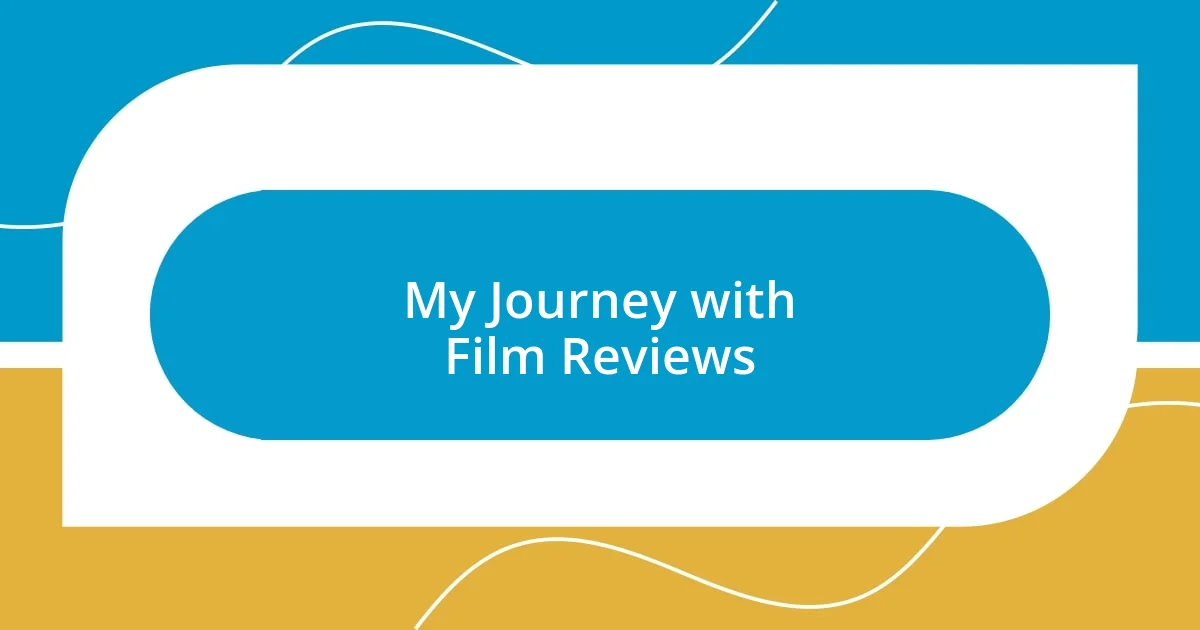
My Journey with Film Reviews
My journey with film reviews began somewhat unexpectedly. I was sitting in a dimly lit theater, completely absorbed in a French drama that beautifully blended melancholy with hope. As the credits rolled, I felt an urge to share my experience and unravel the film’s emotional layers. This initial spark propelled me into a realm where I explored not just the movies themselves, but the myriad of feelings and thoughts they inspired in me.
- Engaging with film critiques opened my eyes to the subtleties of storytelling.
- I’ve found that personal experiences can shape my interpretations of a film.
- Writing about a film often helps crystallize my thoughts and emotions around it, making each movie viewing a richer experience.
- Sometimes, I even revisit a movie after writing about it, finding newfound depth that eluded me initially.
My approach to film reviews has evolved significantly over time. I vividly recall critiquing a captivating Iranian film that displayed the delicate nuances of family dynamics. While writing my analysis, I was reminded of my own familial relationships, which added a personal layer to my critique. The way the film portrayed love and conflict felt so familiar yet refreshingly different. What I learned was that the beauty of film reviews lies in their ability to connect our unique stories with those told on screen, enriching not just the films we watch but our own understanding of ourselves and others.
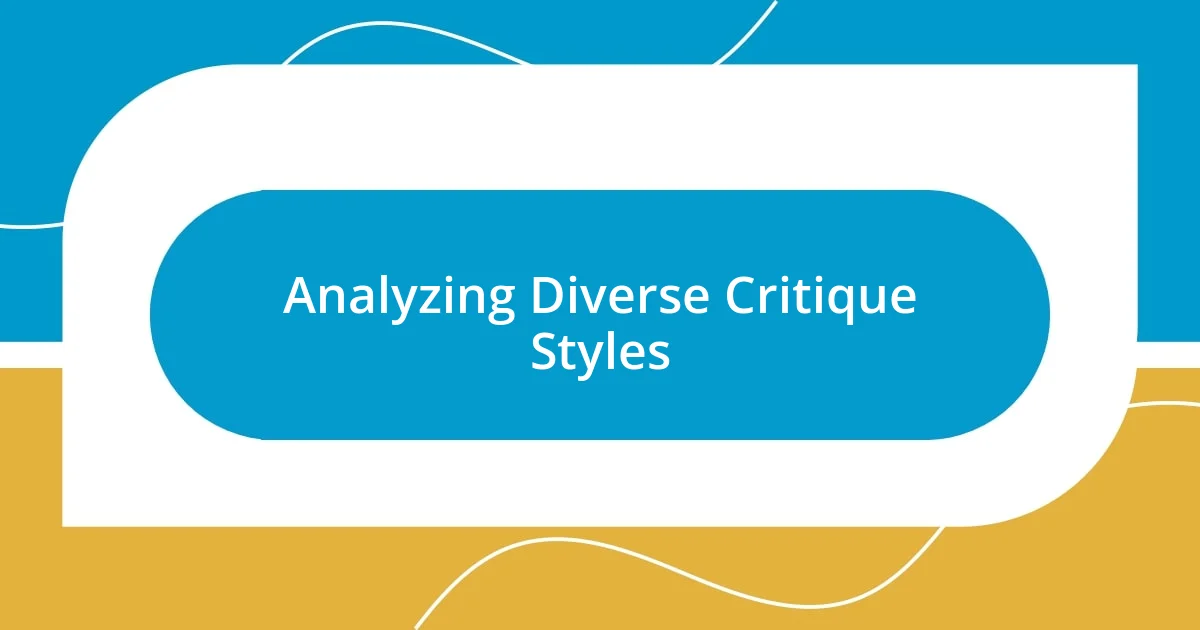
Analyzing Diverse Critique Styles
Engaging with diverse critique styles has profoundly influenced my understanding of film. When I delved into Latin American cinema, I encountered a blend of vibrant colors and raw narratives. It was an eye-opening experience to grasp how local histories and socio-political contexts shaped these films. Have you ever felt that a film spoke directly to your own experiences, yet seemed so foreign at the same time? It’s fascinating to see how critique styles can resonate on a deeply personal level, merging our memories with the storytellers’ intentions.
In my experience, some critics focus heavily on technical elements, like cinematography and editing, while others emphasize emotional resonance. I once attended a workshop where an Asian film critic broke down a popular Chinese drama by analyzing its pacing and score. As I listened, I realized how these elements crafted a narrative that was both lyrical and haunting. It made me reflect on whether I had been too focused on the storyline alone. What role do these technical aspects play in our emotional engagement with a film? This sparked an appreciation for the artistry behind filmmaking that I hadn’t fully acknowledged before.
I’ve found that personal biases can also shape how we critique international films. For instance, when I watched a Mexican film that tackled themes of immigration, it struck a chord with me, as it mirrored discussions I often have with friends. The emotional weight was heavy, and my critique reflected that, blending my sentiments with cultural observations. How does our own background influence our analysis? This realization made me recognize that critiques are not just isolated assessments; they are profoundly impacted by who we are and what we’ve experienced in life.
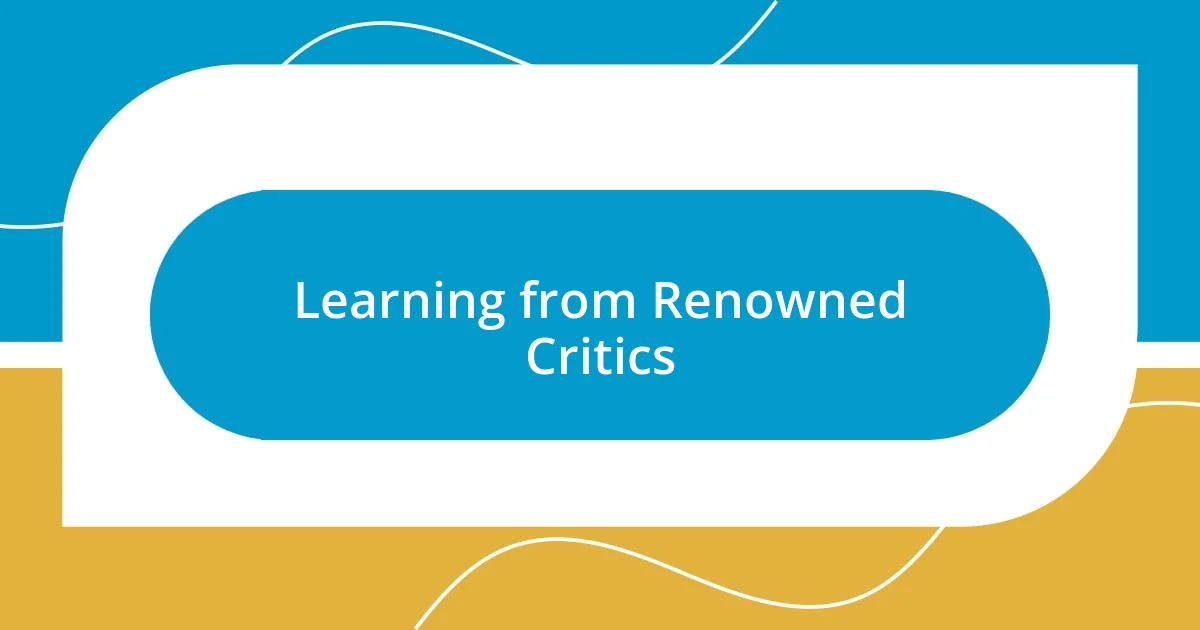
Learning from Renowned Critics
As I delved into the writings of renowned critics, I found their perspectives to be invaluable sources of inspiration. One particular instance that stood out was reading a review by Roger Ebert on a lesser-known film. His ability to articulate the emotional landscape of the movie made me reconsider my own viewing experience. I thought, how do these legendary critics pick apart layers within a film that I sometimes overlook? This awareness not only refined my own critique style but taught me to appreciate the intricacies at play.
I’ve learned that the wisdom of critics like Pauline Kael or David Bordwell isn’t just about film analysis; it reflects their unique voices and personalities. Through their writing, I’ve discovered that infusing one’s voice adds depth to critiques. I recall a moment when I tried to incorporate my personality when analyzing a bold Italian comedy. The feedback I received made me realize how authenticity could elevate my writing while also resonating with others. Isn’t it fascinating how our individual perspectives can create a richer dialogue around films?
Reflecting on the critiques from international critics, I’ve come to appreciate the cultural lens through which they view films. For example, a British critic once discussed a Scottish film that challenged societal norms. I realized, while there are universal themes in filmmaking, regional contexts often shape narratives in profound ways. This insight urges me to ask—how much do our cultural backgrounds influence our interpretations? Engaging with such critiques not only broadens my understanding of film but also deepens my connection to a global cinematic language.

Applying Feedback to My Work
When I receive feedback, I try to see it as a conversation rather than criticism. I remember a time when a mentor suggested that I pay more attention to character development in my reviews. Initially, I felt a twinge of defensiveness, but then I realized that this advice could enrich my critiques. It made me wonder, have I been so focused on plot that I’ve overlooked the very heart of storytelling? Embracing this feedback allowed me to add layers to my analysis, making it much more meaningful.
I’ve learned to take notes during review sessions and categorize the feedback I gather. For instance, after sharing my critique of a Swedish film at a local film club, I received a mix of responses regarding my interpretation of the cinematography. Some found my view compelling, while others thought I was off base. This contrast prompted me to reevaluate how I articulate my opinions. It’s fascinating how diverse perspectives can push us to redefine our approach. How do others perceive what I might take for granted? This process has led me to a more nuanced understanding of film and my voice within that landscape.
Incorporating feedback doesn’t just refine my work; it also inspires me. After a particularly insightful critique session, I decided to explore the emotional undercurrents of a French drama more deeply in my next piece. I can vividly recall my excitement as I dove into the characters’ struggles, passion, and resilience. The feedback acted as a catalyst, encouraging me to embrace vulnerability in my writing. How often do we underestimate the power of constructive feedback in guiding our creative journeys? I now view it as a powerful tool to elevate my analyses, paving the way for richer connections with my audience.
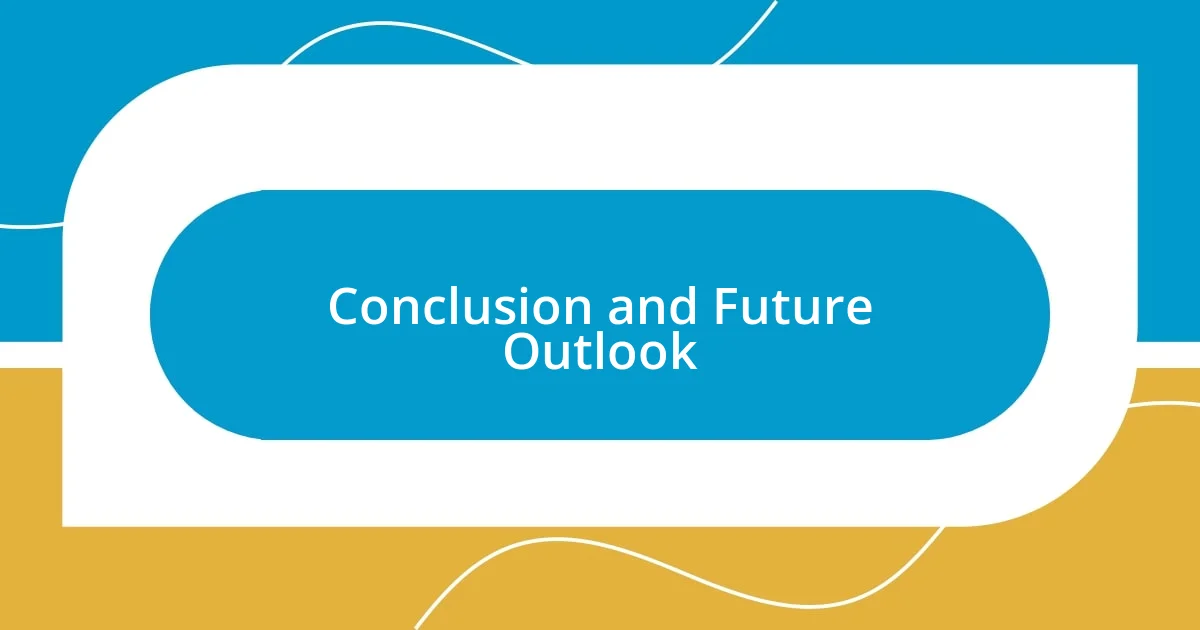
Conclusion and Future Outlook
Reflecting on my journey through international film critiques, I can confidently say that the insights gained have been profound and transformative. Each review is not merely an assessment; it is an invitation to explore the broader implications of storytelling on our lives. I often find myself pondering how a film can resonate deeply with audiences across cultures, making me appreciate the rich tapestry of narratives that connect us all. Isn’t it amazing how a single film can spark diverse conversations around the globe?
Looking ahead, I believe that the landscape of film criticism will continue to evolve, driven by digital platforms and the voices of underserved communities. As more diverse perspectives emerge, I find myself curious about how these new narratives will influence established norms within film critique. I often think about the potential for deeper engagement as critics draw upon personal experiences, much like I have. How will this shift enrich our understanding of global cinema and challenge our preconceptions?
Moreover, I feel strongly that the dialogue surrounding film critiques should remain open and dynamic. By embracing a variety of opinions and interpretations, we create a more inclusive environment for discussion. I remember the exhilarating feeling of discussing a controversial film with a group that had differing views. Each opinion added a layer I hadn’t considered before. It raises the question—how can we foster such environments in an increasingly polarized world? With my experiences at the forefront, I look forward to participating in these critical conversations that not only expand my own understanding but also invite others to share in this incredible journey through cinema.
